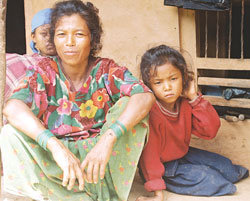 |
| TIME DOESN'T HEAL: The front page of Nepali Times on 9 August 2002 with the photograph of Syani (left) and Kaman Maya Praja with her baby who were widowed at 15 after their husbands were killed by the army in Kalikot in February 2002. |
A terrible helplessness hangs over the village of Jogimara in Dhading district more than five years after the army massacred 17 of its men in an attack in Kalikot, an incident that the government has never properly explained.
The bewildered relatives still have no clear idea why the soldiers killed their sons, fathers, husbands, and brothers, and they do not have the political clout that is needed to get their questions answered. Most of Jogimara's men were killed, leaving their families destitute.
"The wound is still fresh but we don't know whom to meet, we don't know where to go, we can't read or write" said Gyan Bahadur Chepang who lost two sons, Sanu and Tek Bahadur, in the assault.
In May 2006, the army finally accepted that those killed were innocent, but said they may have been killed in the crossfire, and recommended the payment of compensation. But the government has not paid out a single rupee, and some villagers are bitter.
|
|
| Kaman Maya married her brother-in-law and lives in Jogimara, this picture of her (above) was taken two weeks ago in Jogimara. Syani Maya married again and has moved out. |
"Many organisations have helped us," said Sukmaya Chepang, a widow whose 60-year-old husband, Chitra Bahadur, was the oldest person killed in the attack, "but the government we elected killed our relatives and declared them terrorists."
Another villager, Gobinda Chepang, is equally disgusted.
"The government may not be able to give us our relatives back, but it could at least compensate us and punish the killers," he said. While most families have now accepted their men will never come home, and have performed the required funeral rites, some cannot lay their anguish to rest.
Sukmaya Chepang can still convince herself at times that her husband might still walk through the door. "I hope he will come home one day with the money he earned," she said, "I'm looking forward to his arrival."
He left home with 19 other men from the village in November 2001, attracted by the chance to earn some desperately-needed money building an airstrip at Kotbada in Kalikot district, more than 500km away in western Nepal.
 |
| Moved by the tragedy of Jogimara, overseas Nepalis donated money and the families who received help posed for this group picture in 2002. Since this photo was taken, five of the widows have married again, two families have moved out, one father and one mother of Jogimara victims in this picture have died. |
On the morning of 24 February 2002 the army attacked the construction workers' quarters, killing 35 people, including 17 from Jogimara. Rumours of what had happened trickled back to their families. (See:Unfriendly fire) First they heard in the news that 67 \'terrorists\' had been killed in Kalikot. Then they heard their own relatives were among the dead.
"Some said they were massacred, some said they were lined up and shot, some said they were killed by bombs dropped from the air, and some said they were in hiding," recalls Shankha Bahadur.
 |
| Sukmaya Chepang and her daughters earlier this month. Sukmaya's husband Chitra Bahadur was the oldest person from Jogimara to be killed in the Kotbada massacre. |
The impact on the village has been devastating. The 17 dead included nine under the age of 21 who were among the strongest in the village. The attack also left 18 children without a father and created 10 widows. There has been a ceasefire now for more than a year and the Maoists are in government, but aside from a letter of gratitude from the Maoists, the relatives of the Kotbada massacre have got nothing.
They have found different ways to deal with the deaths. Man Bahadur BK, who lost a son, sold up and left the village for good. "That won't solve his problem," said his brother, Gyan Bahadur, who lost two sons. "How can he erase the memory of his son?"
Gyan Bahadur has taken a different approach. "It's not that I've forgotten my sons," he said. "I won't be able to do that for the rest of my life. But I've stopped showing my suffering to others. I weep at night."



